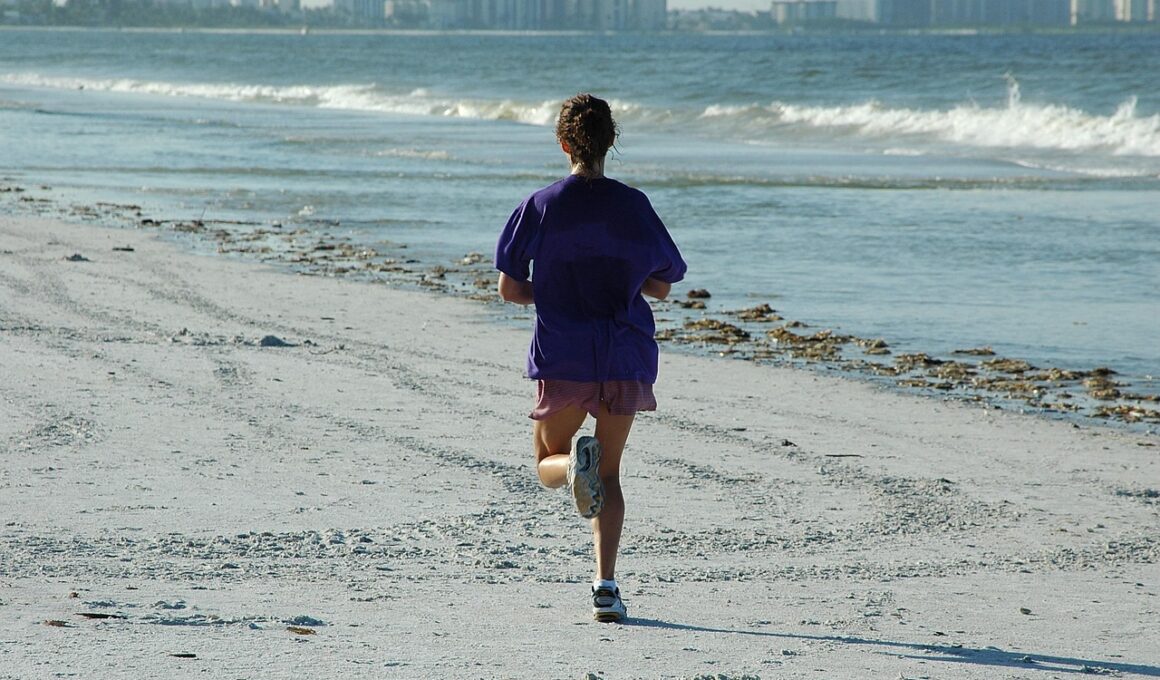The Impact of Nature on Exercise Recovery
Physical activities in natural settings provide unique benefits that enhance recovery. Engaging in exercise surrounded by greenery can lead to both physical and mental improvements. The calming influence of nature decreases stress hormones, thereby promoting relaxation. Research indicates that natural environments significantly improve mental recovery. Also, being outdoors typically encourages greater joy in exercising, leading to more productive workouts. Aesthetic views can inspire longer sessions and stronger commitments. Moreover, outdoor workouts allow for various activities, improving cardiovascular health and overall fitness. Exposure to natural sunlight helps regulate sleep patterns, vital for recovery. The combination of nature and exercise boosts endorphin levels, which are essential for reducing pain perception. Additionally, exercising outdoors fosters social connections. Participating in group activities provides a platform for encouragement and motivation. The sense of community enhances adherence to fitness goals. Joining groups also diversifies the types of exercises performed, providing a holistic approach to recovery. Given these benefits, incorporating outdoor activities can be a pivotal component in any fitness regimen aimed at improving recovery outcomes.
Connection Between Nature and Mental Health has also been studied extensively, with numerous findings linking green spaces to better psychological well-being. Outdoor environments promote mindfulness, which aids in stress relief. Mindfulness, often practiced during outdoor workouts, fosters a strong mind-body connection. Individuals who exercise outside report increased feelings of satisfaction and happiness post-exercise. Various studies link nature exposure with significant reductions in anxiety and depression levels. People believed to benefit most are those undergoing high-stressed lives. The restoration and healing effects of being outdoors encourage a mindset conducive to positive recovery. Nature can stimulate cognitive function that is integral to resilience and stress management. Furthermore, individuals who frequently engage with nature exhibit greater social interactions. This connection reduces feelings of isolation often associated with a sedentary lifestyle. Enhanced social relationships foster a supportive network that inspires continued adherence to fitness regimens. Natural environments enhance motivation and commitment to fitness goals. As a result, outdoor exercise is not only instrumental for physical recovery but also plays a crucial role in holistic mental health support.
Variety in Outdoor Fitness contributes significantly to enhanced exercise recovery. Utilizing diverse environments, such as parks and trails, adds an element of excitement to workouts. This variation challenges the body in different ways. Different surfaces, elevation changes, and scenery stimulate different muscle groups. Engaging in trail running or cycling not only builds cardiovascular endurance but strengthens surrounding muscles required for balance and stability. This varied training can lead to fewer injuries, thus enhancing recovery. Additionally, being creative with outdoor workouts prevents boredom. Incorporating natural obstacles, like logs or hills, facilitates strength training. Flexibility and coordination improve through a mix of exercises. Outdoor fitness allows individuals to choose their desired intensity of workouts, catering to their personal fitness levels. This aspect is crucial for those recovering from injuries, as it promotes gradual progress. Furthermore, finding fitness groups that engage in varied outdoor activities fosters camaraderie. Support from others further enhances workout commitment. Thus, variety in outdoor fitness sets the stage for sustainable recovery while keeping exercise enjoyable.
Hydration and Nutrition in Nature
Staying hydrated is essential during outdoor workouts. Engaging in physical activities in natural settings makes awareness of hydration crucial. The natural environment can affect how much water one should consume. Variables such as temperature, humidity, and intensity dictate hydration needs. It’s vital to blueprint a hydration plan before partaking in exercises outside. Carrying water and nutrient-rich snacks can sustain energy levels throughout workouts. Incorporating fruits and vegetables post-exercise supports faster recovery through vitamins and minerals. Nature can enhance physical performance, but proper nutrition complements these efforts. The synergy between exercise and nutrition drives optimal recovery. Specific antioxidants found in healthy foods combat oxidative stress caused by strenuous activities. Consuming nutrients shortly after exercising boosts muscle repair and replenishes lost glycogen stores rapidly. These phases are crucial for athletes and fitness enthusiasts alike. Moreover, enhanced oxygen flow from dietary greens promotes energy levels and overall wellness. Research suggests leafy greens serve as superfoods for endurance athletes. Educating oneself on nutritional needs can further this recovery process, advocating a balanced approach to outdoor fitness and nutrition.
Breathing in Fresh Air while exercising outdoors offers profound benefits for recovery. Fresh air enhances lung function, which is essential for effective oxygen intake. Improved oxygen levels nourish muscles, speeding up recovery post-exercise. The act of deep breathing calms the nervous system. Controlled breathing techniques practiced during outdoor workouts can lead to lower heart rates and reduced anxiety. All these outcomes contribute positively to overall recovery processes. By promoting relaxation and reducing physical stress, individuals will notice enhanced performance in subsequent workouts. Additionally, being surrounded by trees enhances air quality. Pollutants are filtered, providing cleaner air that fuels better respiratory function. Physiological effects like increased lung capacity and improved oxygenation become evident. Furthermore, many outdoor settings allow for mindful breathing practices, reducing mental fatigue. Such practices correlate with increased cardiovascular efficiency and endurance, aiding recovery. Consequently, fresh air acts as a natural performance enhancer during workouts, leading to a more holistic approach to fitness and health. Recognizing the significance of breathing properly while exercising outdoors is key to maximizing the recuperative benefits available.
The Role of Community in Outdoor Fitness
Involvement in a fitness community enhances the pathway to recovery. Engaging with a group can provide the necessary motivation and accountability essential for achieving fitness goals. Groups often organize outdoor sessions, which create an environment full of encouragement. Exercise becomes less of a burden and more of a communal activity. The bonding that occurs during shared fitness experiences fosters overall enjoyment of exercise. Individuals may feel less isolated, significantly boosting mental health. Support systems are crucial during challenging recovery phases. A network cheering one on encourages persistence, leading to more consistent workouts. Group members can also provide valuable recommendations on recovery techniques and experiences. Additionally, they may suggest fun outdoor activities that keep fitness interesting. Such dynamic interactions elevate the overall experience of exercise, ensuring individuals remain engaged and enthusiastic. Furthermore, sharing progress within these communities instills a sense of accomplishment. The shared victory encourages dedication to outdoor fitness. Emphasizing the importance of social support ensures that recovery becomes a celebrated journey rather than one marked by solitude. Recognizing the social aspect provides a deeper understanding of fitness communities.
The benefits of outdoor fitness on recovery extend beyond immediate effects. In the long term, consistent participation influences overall well-being positively. Individuals adopting an outdoor fitness regime often experience marked improvements in their quality of life. Regular exposure to nature contributes to resilience against mental fatigue and physical burnout. Those who engage regularly report higher satisfaction with their workouts. Exercise becomes a ceremonial act of self-care, allowing for organic interactions with nature. Such experiences reinforce the intrinsic joys of movement. As individuals build connections with their surroundings through exercise, they develop a deeper appreciation for their environment. The harmony that outdoor fitness cultivates can lead to sustainable habits over time. Incorporating fitness in conjunction with nature fosters holistic health, allowing for physical, mental, and emotional improvements. This unique relationship highlights the importance of advocating outdoor workouts. Sustainability becomes an achievable goal when motivated by natural surroundings. As the fitness community grows, nurturing outdoor activities will lead to healthier lifestyles. The lasting impact on recovery could redefine how individuals approach fitness in the modern world. Creating a genuine bond with nature fosters an enduring passion for fitness.


